NCERT Solutions for Class 7th English Chapter 8 Fire Friend and Foe
Comprehension Check
Question 1:
Mark the correct answer in each of the following.
-
Early mart was frightened of
(a) lightening and volcanoes.
(b) the damage caused by them.
(c) fire. -
(a)
Fire is energy.
(b) Fire is heat and light.
(c) Fire is the result of chemical reaction.
Solution:
- (c) fire
- (c) Fire is the result of chemical reaction
Question 2:
From the boxes given below choose the one with the correct order of the following sentences.
(i)
That is fire.
(ii)
A chemical reaction takes place.
(iii)
Energy in the form of heat and light is released. .
(iv)
Oxygen combines with carbon and hydrogen.
(i)
(ii) (iii) (iv) (ii) (iii) (i) (iv)
(iii) (iii) (ii) (i) (iv) (ii) (iii) (i)
Solution:
(iv) (ii) (iii) (i)
Working with the Text
Answer the following questions.
Question 1:
What do you understand by the ‘flash point’ of a fuel?
Solution:
Every fuel catches fire at a particular temperature. This temperature is called the ‘flash point’ of a fuel.
Question 2:
- What are some common uses of fire?
- In what sense is it a ‘bad master’?
Solution:
- Fire is used in cooking, to keep our homes warm during winter. Fire is also used to produce electricity.
- If fire goes out of control, it can cause damage to our life, house and property. It is ‘bad master’ in this sense.
Question 3:
Match items in Column A with those in Column B.
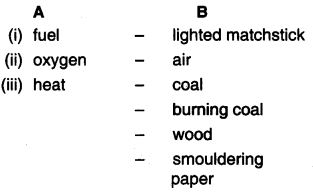
Solution:
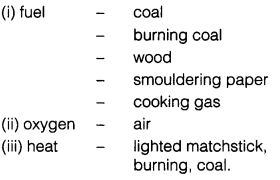
Question 4:
What are the three main ways in which a fire can be controlled or put out?
Solution:
Fire can be put out by taking away the fuel, stopping the supply of oxygen or by lowering down the temperature around the fuel, so that the fuel is not able to attain its flash point.
Question 5:
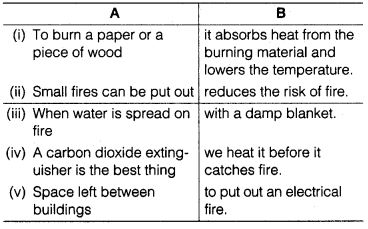
Solution:
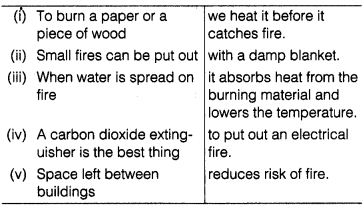
Working with Language
Question 1:
Read the following sentences.
To burn paper or a piece of wood, we heat it before it catches fire. We generally do it with a lighted match. Every fuel has a particular temperature at which it burns.
The verbs in italics are in the simple present tense. When we use it, we are not thinking only about the present. We use it to say that something happens all the time or repeatedly or that something is true in general.
Find ten examples of verbs in the simple present tense in the text ‘Fire: Friend and Foe’ and write them down here. Do not include any passive verbs.
Solution:
- Fire is the result of a chemical reaction.
- This is what we call fire.
- To burn a piece of paper or wood, we heat it before it catches fire.
- Oxygen comes from the air.
- It is sometimes said that fire is a good servant, but a bad master.
- The third way to putting out a fire is to remove heat.
- We spend millions of rupees each year in fighting fire.
- It absorbs heat from burning fuel.
-
It only means that fire is very useful.
Fire is still worshipped in many parts of the world.
Question 2:
Fill in the blanks in the sentences below with words from the box. You may use a word more than once.
![]()
- Gandhiji’s life was devoted to the ……………. of justice and fair play.
- Have you inspired your house against …………..?
- Diamond is nothing, but ………….. in its purest form.
- If you put too much coal on the fire at once you will ………. it.
- Smoking is said to be the main ………… of heart disease.
-
When asked by an ambitious writer whether he should put some ……….. into his stories. Somerset
Maugham murmured, “No, the other way round”. - She is ……………. a copy of her mother.
- It is often difficult to ……………. a yawn when you listen to a long speech on the value of time.
Solution:
- cause
- fire
- carbon
- smother
- cause
- fire
- carbon
Question 3:
One word is italicised in each sentence. Find its opposite in the box and fill in the blanks.
![]()
- You were required to keep all the doors open, not ……………
-
Pupil:
What mark did I get in yesterday’s Maths test?
Teacher: You got what when you add five and ……………… five and ten from the total? - Run four kilometers a day to preserve your health. Run a lot more to …………….. it.
- If a doctor advises a lean and lanky patient to …………… reduce his weight further, be sure he is doing it to his income.
-
The world is too much with us; late and soon.
Getting and ………….. we lay waste our powers. -WORDSWORTH
Solution:
- shut
- subtract
- destroy
- increase
- spending
Question 4:
Use the words given in the box to fill in the blanks in the sentences below.
![]()
- The cat chased the mouse …………… the lawn.
-
We were not allowed to cross the frontier.
So, we drove …………. it as far as we could and came back happy. - The horse went ……….. the winning post and had to be stopped with difficulty.
- It is not difficult to see ………….. your plan. Anyone can see your motive.
- Go ……………. the yellow line, then turn left. You will reach the post office in five minutes.
Solution:
- across
- along
- past
- through
- along
Speaking and Writing
Question 1:
Look at the following three units. First re-order ( the items in each unit to make a meaningful sentence. Next, re-order the sentences to make a meaningful paragraph. Use correct punctuation marks in the paragraph.
- and eighteen fire tenders struggled/the fire began on Monday/ to douse the blaze till morning
- in a major fire/ over 25 shops/ were gutted
- but property/was destroyed/worth several lakhs/no causalities were reported.
Solution:
- The fire began on Monday and eighteen fire tenders struggled to douse the blaze till morning.
- Over 25 shops were gutted in a major fire.
- No causalities were reported, but properties worth several lakhs were destroyed.
Question 2:
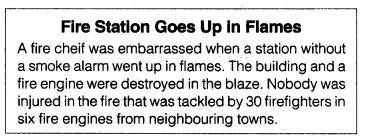
Very Short Answer Type Questions
Question 1:
Why the early man was afraid of fire?
Solution:
The early man might have seen volcanoes or lightning before he started using fire and was hence knew it was dangerous and powerful. So, he was scared of fire.
Question 2:
Give some examples of fuel.
Solution:
Wood, coal, cooking gas and petrol are examples of fuel.
Question 3:
Why a newspaper or stick lying in the open does not catch fire on its own?
Solution:
A fuel in presence of oxygen alone can’t start burning. Heat is required for a fuel to catch fire. That is the reason why a newspaper or stick lying in the open doesn’t catches fire.
Question 4:
Why gaps are left between buildings during construction?
Solution:
Gaps are left-between building during construction to reduce the risk of fire.
Question 5:
How the discovery of fire has helped the mankind?
Solution:
Discovery of fire has helped the early man to cope with nature. It also helped them adopt a settle mode of life.
Short Answer Type Questions
Question 1:
How fire is a good servant?
Solution:
Fire is a good servant. When kept under control fire helps us do many things. In most of our home we cook our food on fire.
We use fire to keep us warm during extreme winter. It is also used in generating electricity.
Question 2:
Before fire brigades were set out, how people tried to put out fire.
Solution:
Before the fire brigade came into the picture people used to extinguish fire forming human chain. Everyone was a fireman in that scenario.
People used to pass buckets filled with water from a pond or well through each other and the person at the extreme end used to pour it over the flames.
Question 3:
How have we learnt to control fire?
Solution:
Every year we spend millions of rupees for fighting fires. We spend even large sum of money to find out ways to prevent fire from happening and going out of control. In the process we have learnt to control fire and use it for our betterment.
Long Answer Type Questions
Question 1:
Explain with an example how can you put out fire by cutting the supply of oxygen.
Solution:
Oxygen is one of the three elements essential for causing fire. If we can disrupt the supply of oxygen then we can put of the fire.
This can be applied in case of small fires. If we throw a damp blanket or a sack over the fire, it cuts off the supply of oxygen and the fire is immediately put off.
Question 2:
Why we cannot use water to put out some fires?
Solution:
We cannot use water in case of oil and electric fires. Oil floats over water and thus oil fires cannot be extinguished using water.
Water flows on and it has the risk of spreading the fire along. In case of electric fires water cannot be used as an extinguisher. It being a good conductor of electricity, puts the life of the man spraying it in danger.
Extract Based Questions
Extract 1
Directions
(Q. Nos. 1-6) Read the extract given below and answer the following questions.
Some fire cannot be put out with water. If water is
sprayed onto an oil fire, the oil will float to the top
of the water and continue to burn. This can be very
dangerous because water can flow quickly, carrying
the burning oil with it and spreading the fire.
Question 1:
What is oil fire?
Solution:
A fire caused because of inflammable oils like petroleum, kerosene, diesel etc is called oil fire.
Question 2:
Name two kinds of fire that cannot be extinguished using water.
Solution:
Oil fire and electric fire cannot be extinguished using water.
Question 3:
Why water cannot be used to put out on oil fire?
Solution:
Oil being lighter than water floats over it, so water cannot be used to extinguish oil fires. Moreover, as the water spreads it carries along the oil with which in turn extends the fire.
Question 4:
Water cannot extinguish oil fire, but
(a)
controls it
(b)
spreads it
(c)
has not impact on it
(d)
None of these
Solution:
(b)
spreads it
Question 5:
Find one word from the given lines that is antonym of ‘slow’.
(a)
Spray
(b)
Dangerous
(c)
Rapid
(d)
Quick
Solution:
(d)
Quick
Question 6:
What can be used to control oil fires?
(a)
Carbon extinguishers
(b)
Damp blanket
(c)
Sand
(d)
All of the above
Solution:
(d)
All of the above
Extract 2
Directions
(Q. Nos. 1-6) Read the extract given below and answer the following questions.
The second way of putting the ……………….. burning material. The third way of putting out a fire is to remove the heat.
Question 1:
How can small fires be put out?
Solution:
Small fires can be put out using a damp blanket or a sack, since it shops oxygen from reaching the burning material.
Question 2:
What prevents oxygen to reach the burning material?
(a)
Nitrogen
(b)
Carbon dioxide
(c)
Water
(d)
Heat
Solution:
(b)
Carbon dioxide
Question 3:
What is the third way of putting out a fire?
Solution:
The third way of putting out a fire is to remove the heat.
Question 4:
What is the method of extinguishing fire mentioned in the above extract?
(a)
Removing the heat
(b)
Spraying water
(c)
Removing the fuel
(d)
Removing the supply of oxygen
Solution:
(d)
Removing the supply of oxygen
Question 5:
Which word in the above extract means ‘stop burning’?
Solution:
Extinguish
Question 6:
Which word in the above extract is a synonym of ‘moist’?
Solution:
Damp
NCERT Solutions Maths Science Social English Sanskrit Hindi RD Sharma